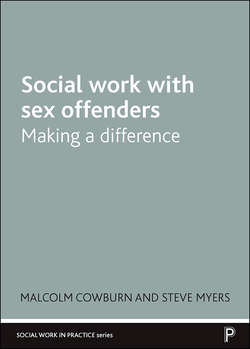Читать книгу Social Work with Sex Offenders - Cowburn Malcolm - Страница 8
На сайте Литреса книга снята с продажи.
Values and terminologies
Оглавление‘Value(s)’ is a nebulous term potentially covering areas as diverse as economics, theology, philosophy, business studies, medicine and all of the social sciences, to name but a few. It is a slippery concept to engage with and can leave more confusion and less clarity in its wake. However, Sarah Banks (2006, p 6) provides a gentle introduction: ‘“values” can be regarded as particular types of belief that people hold about what is regarded worthy or valuable’. This section clarifies the terms we use throughout the book and why we use them. Gregory and Holloway (2005) have shown how language socially constructs social work, the social worker and the people that social workers are required to professionally engage with. This means that the language used in legislation, social work texts, social work reports and social work records creates, through description and analysis, the social work role, tasks and methods. It also constructs the social worker and the different groups of people s/he engages with (eg some people are portrayed as being vulnerable, some as alienated and some as criminal). Gregory and Holloway (2005) identify three forms of language through which this occurs: ‘moral’, ‘therapeutic’ and ‘managerial’. Social work is variously described in terms that highlight its moral, therapeutic or managerial purpose. We explore these (and other) perspectives in the next chapter; however, it is important to recognise that the language we use is never value-free. Clarifying terminology is therefore not merely a process of using the ‘right’ language; rather, it is a constructive process that embodies particular value orientations of social work.
